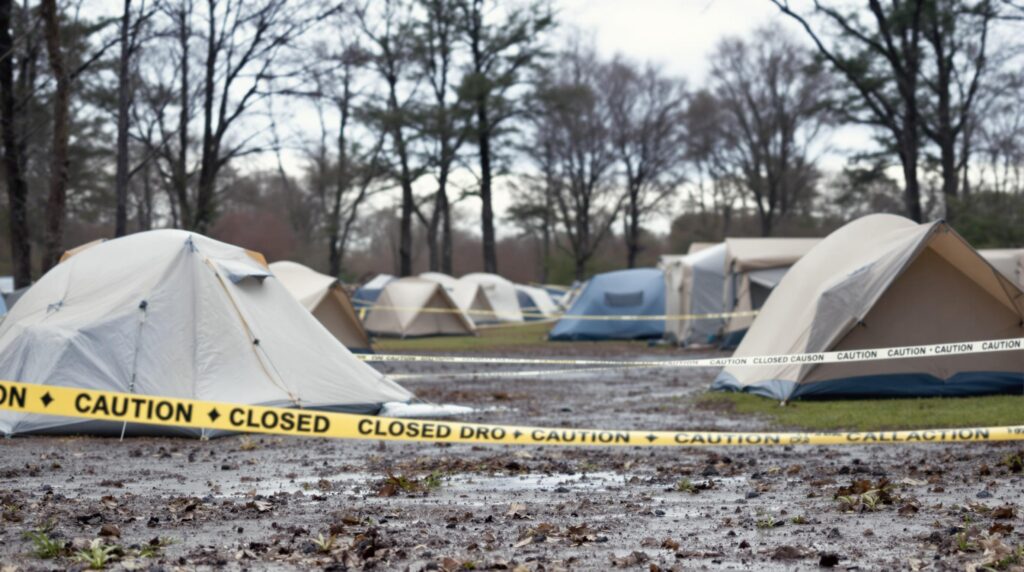San Diego County officials have been urged to postpone the reopening of the Tijuana River Valley Regional Park Campground, a facility that originally cost $12 million to develop and features 51 campsites, 10 yurts, community gardens and ball fields. The site closed in January 2024 after severe flooding, and local concerns about persistent sewage contamination have intensified discussion on whether it is truly ready for visitors.
Mayor Paloma Aguirre has publicly spoken against the planned April 1, 2025 reopening, noting that residents in the vicinity have complained of illness linked to polluted water and air. The region has endured a cross-border sewage crisis for decades, with local officials attributing frequent closures of nearby shorelines to sewage since December 2021.
In one statement a local source quotes Aguirre as saying, “The county should be focused on cleaning up the sewage, not putting a campground in it,” while adding, “I’ve heard from too many residents and workers getting sick — headaches, nausea, respiratory illness. Reopening this campground while the air and water remain compromised is dangerous to rangers and campers and a waste of our tax dollars. We need the county to do its part to fix the sewage crisis, not pretend like it doesn’t exist.” She claims these conditions remain hazardous to public health.
During remarks a separate article also captured Aguirre repeating her stance that reopening at this juncture exposes the public to what she calls “dangerous” conditions. She has criticized what she perceives as official attempts to dismiss the severity of the contamination, arguing that more decisive action is necessary to safeguard community health.
Meanwhile, the Service Employees International Union Local 221, representing county park rangers assigned to the site, has filed a cease-and-desist notice demanding the scheduled reopening be delayed. Union representatives say the county’s own soil-test data, which has not been independently verified, is insufficient to guarantee safety, and they want further evaluations to ensure rangers will not be placing themselves or visitors at risk.
A statement attributed to union representative Crystal Irving reads, “This is a safety issue — plain and simple,” and continues, “County workers were never consulted about the risks of returning to the site and the county is ignoring the sewage crisis’ health impacts. There are serious concerns about air quality, illness and lack of testing. Our members love serving the public and the outdoors, but we can’t responsibly welcome anyone to this campground until the sewage contamination is fixed.”
In another report, Irving reiterated her belief that county workers were left out of discussions. She questioned whether officials fully considered the lingering pollution before selecting a firm date for the campground’s relaunch, suggesting that more transparency was needed to ensure employee well-being.
In another local story, Irving also stated, “This park is amazing, offers so much to the community – it’s beautiful, but it needs to be safe,” and, “The County is ignoring this crisis and the health impacts it’s causing. There are serious concerns about the air quality, illness and the lack of testing.”
Campground operators normally employ certain environmental risk management strategies to address potential hazards. They often conduct ongoing assessments of soil, water and air to detect contaminants before visitors or staff occupy the site. They also maintain rigorous schedules for inspections and drainage control to prevent flooding or water contamination, use protective barriers and signage to mark high-risk zones and create contingency plans in case partial closures or modified layouts become necessary.
Those in charge of campground facilities also emphasize clear staff and guest communication protocols to handle situations like possible sewage contamination. They frequently train employees to deliver consistent safety briefings, provide updates through digital platforms, collaborate with local agencies to stay informed of evolving guidelines and install clear signage explaining risks such as cross-border pollution or flooding concerns.
Ensuring clarity for staff and guests can help prevent confusion about health guidelines. Officials can post updated notices on changing conditions and coordinate with county health authorities to minimize the possibility of visitors unknowingly entering unsafe zones. Adopting structured communications and training programs fosters greater trust and compliance among both employees and the public.
Additional context suggests that well-placed messaging and educational materials produce notable improvements in visitor behavior and environmental stewardship. Data reported in the peer-reviewed findings showed a 22% reduction in improper food storage, a 35% drop in trash violations and 28% fewer instances of unattended food, with corresponding declines in environmental hazards.
Mayor Aguirre has called for an emergency declaration and more robust federal funding to address longstanding deficiencies in sewage infrastructure. She argues that cross-border flows of untreated wastewater demand regional solutions and resources extending far beyond local measures, aligning her stance with concerns about environmental justice in storm-battered areas.
Many area stakeholders await a final outcome with hopes that local and federal entities can collaborate on more permanent fixes. In the meantime, calls persist for stringent testing, potential delays and stronger measures to protect those who could be vulnerable to lingering toxic spillovers from the cross-border sewage crisis.








